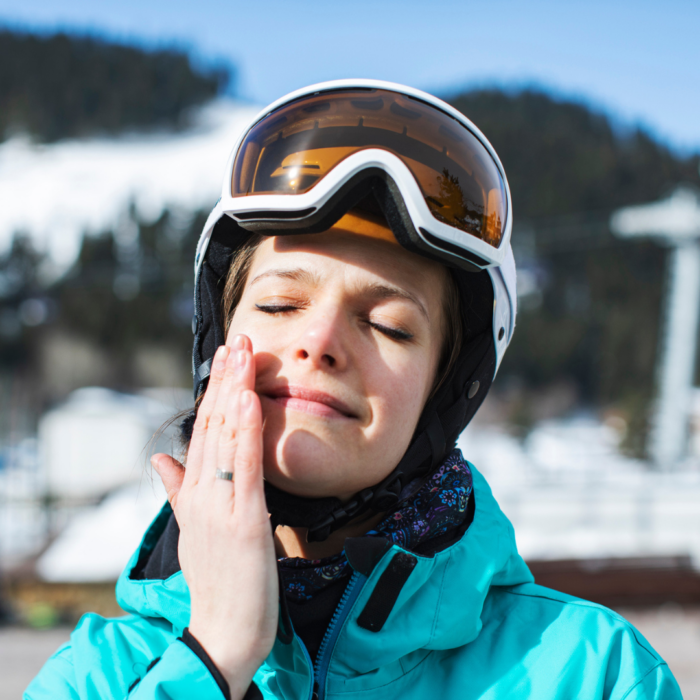
Winter Skiing Skincare: Expert Tips for Cold Weather Care
Edited by Alicia Scherba, FNP-C
Heading to the slopes to enjoy California’s snow season? Before you climb aboard that lift, here’s why and how to adjust your skin care regimen for peak snow glow.
Between the exhilarating runs and après-ski fun, your skin can be affected by the harsh wintry elements. Colder temperatures chill the air with less humidity. This can draw moisture away from the skin. Add the combination of icy winds, high altitude UV-rays, plus parching indoor heat and it’s understandable why skin can become dry and chapped.
So, regardless of your age or skin type, your wintry weather skin care should differ from your normal routine. Here are some useful tips from the dermatologists at the California Skin Institute to help keep your skin smooth and supple despite the wind chill factor.
Block that winter sun
Be sure to apply sunscreen of at least 30 SPF. Winter sun, combined with glare from the snow, can burn your skin and cause lasting damage. Protect yourself with a nongreasy, fast-absorbing sunscreen moisturizer combo. Wear large UV-protective eye gear. And don’t let down your guard on overcast days. As much as 80% of harmful UV rays can pass through clouds. CSI’s Sunscreen Trio bundles together our carefully formulated sunscreen products for a multi-tasking combination.
Beware the winds of winter
If that cold bracing wind makes you teary-eyed, the outer corners of your eyelids can become reddened and sore. Cold winds also can chap your lips and hands. Sunglasses or, if you’re skiing, goggles, gloves, and protective lip balm are recommended.
Lower that thermostat
This isn’t about saving energy – it’s about saving your skin. Dry warm heat from furnaces, fireplaces, and space heaters can overly dry your skin. But some – maybe you or whoever you’re traveling with – like it hot. Pack a portable humidifier in case you can’t turn down the heat.
Avoid overly hot baths and showers
We know. It’s cold outside and a hot bath or shower beckons. But think before you turn up the H faucet. Hot water can strip your skin of its natural oils and dilate your blood vessels, which causes your skin to lose moisture. Keep it as lukewarm as you can. Taking shorter showers or baths also helps cut down on skin dehydration.
Use a gentler cleanser
Select a skin cleanser that is labeled as non-soap. It will contain gentler ingredients and will help you avoid dehydrating your skin with soaps. There are excellent soap-free options that can deep cleanse away makeup and residues without harsh ingredients. The California Skin Institute’s soap-free Gentle Soothing Cleanser gently cleanses while hydrating your skin.
Blot and glop after a shower or bath
Blotting or patting the skin dry rather than rubbing it helps retain more moisture. After a bath or shower, blot skin dry with your towel and then glop on moisturizer – both body lotion and facial moisturizer – within a few minutes to help lock in hydration. A great cream to lock in moisture is the CSI Lipid Barrier Cream, which contains squalene, cholesterol, and lipids for the face and neck.
Choose the best winter moisturizer for your skin
Your go-to moisturizer may not cut it for a colder climate. That said, thicker doesn’t mean better when it comes to moisturizers. Look for a light, non-greasy product that seals in moisture at night and another one with added SPF for day. The California Skin Institute’s dermatologically formulated Soothing Protection Kit with our special botanical Phyto Serum and CSI Sport Sunscreen 45 SPF, our lightweight moisturizing sunscreen that is also waterproof, may be just the thing.
Stay hydrated
Staying hydrated by drinking plenty of fluids is one of the best internal helps for your skin. Water is ideal, but other hydration options can include tea, mulled cider, and cocoa, although be careful about the extra sugar. If you’re having wine or cocktails with dinner, be sure to keep your water glass filled. Alcohol is dehydrating.
Chronic skin issues? Use extra care
If your skin tends to be extra dry, with eczema or psoriasis, you should meet with your CSI dermatologist to map out the best combo of medication, cleanser, and moisturizer for the challenges of colder weather outdoors and dry heat indoors.



 / 291 Reviews
/ 291 Reviews